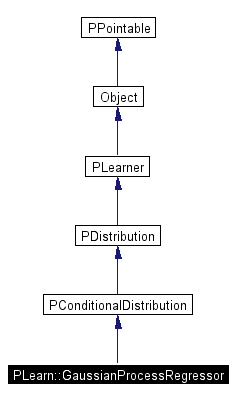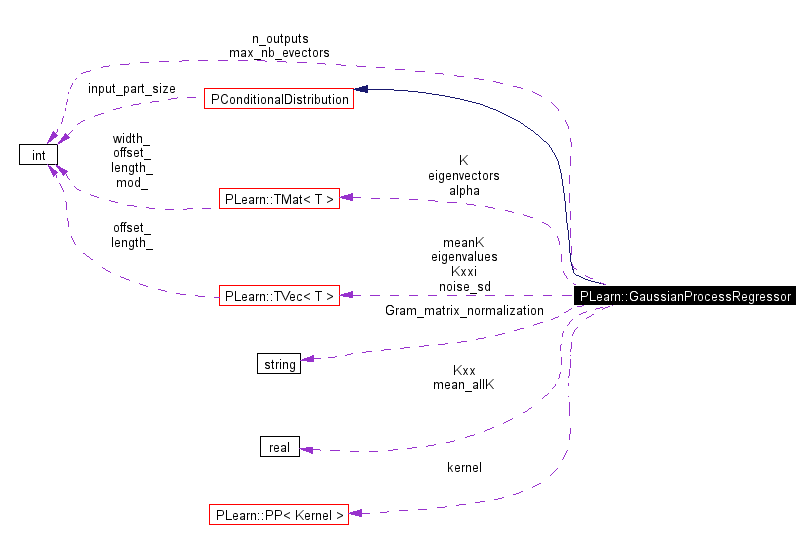
#include <GaussianProcessRegressor.h>
Inheritance diagram for PLearn::GaussianProcessRegressor:


Public Types | |
| typedef PConditionalDistribution | inherited |
Public Member Functions | |
| GaussianProcessRegressor () | |
| virtual | ~GaussianProcessRegressor () |
| virtual void | makeDeepCopyFromShallowCopy (map< const void *, void * > &copies) |
| Transforms a shallow copy into a deep copy. | |
| virtual void | setInput (const Vec &input) |
| Set the input part before using the inherited methods. | |
| virtual void | setInput_const (const Vec &input) const |
| virtual double | log_density (const Vec &x) const |
| return log of probability density log(p(x)) | |
| virtual Vec | expectation () const |
| return E[X] | |
| virtual void | expectation (Vec expected_y) const |
| return E[X] | |
| virtual Mat | variance () const |
| return Var[X] | |
| virtual void | variance (Vec diag_variances) const |
| virtual void | build () |
| Simply calls inherited::build() then build_(). | |
| virtual void | forget () |
| (Re-)initializes the PLearner in its fresh state (that state may depend on the 'seed' option) And sets 'stage' back to 0 (this is the stage of a fresh learner!) | |
| virtual int | outputsize () const |
| Returned value depends on outputs_def. | |
| virtual void | train () |
| The role of the train method is to bring the learner up to stage==nstages, updating the stats with training costs measured on-line in the process. | |
| virtual void | computeOutput (const Vec &input, Vec &output) const |
| Produce outputs according to what is specified in outputs_def. | |
| virtual void | computeCostsFromOutputs (const Vec &input, const Vec &output, const Vec &target, Vec &costs) const |
| This should be defined in subclasses to compute the weighted costs from already computed output. | |
| virtual void | computeOutputAndCosts (const Vec &input, const Vec &target, Vec &output, Vec &costs) const |
| Default calls computeOutput and computeCostsFromOutputs You may overload this if you have a more efficient way to compute both output and weighted costs at the same time. | |
| virtual void | computeCostsOnly (const Vec &input, const Vec &target, Vec &costs) const |
| Default calls computeOutputAndCosts This may be overloaded if there is a more efficient way to compute the costs directly, without computing the whole output vector. | |
| virtual TVec< string > | getTestCostNames () const |
| This should return the names of the costs computed by computeCostsFromOutpus. | |
| virtual TVec< string > | getTrainCostNames () const |
| This should return the names of the objective costs that the train method computes and for which it updates the VecStatsCollector train_stats. | |
| virtual int | nTestCosts () const |
| Caches getTestCostNames().size() in an internal variable the first time it is called, and then returns the content of this variable. | |
| virtual int | nTrainCosts () const |
| Caches getTrainCostNames().size() in an internal variable the first time it is called, and then returns the content of this variable. | |
| int | getTestCostIndex (const string &costname) const |
| returns the index of the given cost in the vector of testcosts (returns -1 if not found) | |
| int | getTrainCostIndex (const string &costname) const |
| returns the index of the given cost in the vector of traincosts (objectives) (returns -1 if not found) | |
| PLEARN_DECLARE_OBJECT (GaussianProcessRegressor) | |
Public Attributes | |
| PP< Kernel > | kernel |
| int | n_outputs |
| Vec | noise_sd |
| string | Gram_matrix_normalization |
| int | max_nb_evectors |
| Mat | alpha |
| Vec | Kxxi |
| real | Kxx |
| Mat | K |
| Mat | eigenvectors |
| Vec | eigenvalues |
| Vec | meanK |
| real | mean_allK |
Protected Member Functions | |
| void | inverseCovTimesVec (real sigma, Vec v, Vec Cinv_v) const |
| real | QFormInverse (real sigma2, Vec u) const |
| real | BayesianCost () |
| to be used for hyper-parameter selection, this is the negative log-likelihood of the training data. | |
Static Protected Member Functions | |
| void | declareOptions (OptionList &ol) |
| Declares this class' options. | |
Private Member Functions | |
| void | build_ () |
| This does the actual building. | |
prediction = E[E[y|x]|training_set] = E[y|x,training_set] prediction[j] = sum_i alpha_{ji} K(x,x_i) = (K(x,x_i))_i' inv(K+sigma^2[j] I) targets
Var[y[j]|x,training_set] = Var[E[y[j]|x]|training_set] + E[Var[y[j]|x]|training_set] where Var[E[y[j]|x]|training_set] = K(x,x)- (K(x,x_i))_i' inv(K+sigma^2[j]) (K(x,x_i))_i and E[Var[y[j]|x]|training_set] = Var[y[j]|x] = sigma^2[j] = noise
costs: MSE = sum_j (y[j] - prediction[j])^2 NLL = sum_j log Normal(y[j];prediction[j],Var[y[j]|x,training_set])
Definition at line 72 of file GaussianProcessRegressor.h.
|
|
Reimplemented from PLearn::PConditionalDistribution. Definition at line 76 of file GaussianProcessRegressor.h. Referenced by GaussianProcessRegressor(). |
|
|
Definition at line 49 of file GaussianProcessRegressor.cc. References inherited. |
|
|
Definition at line 180 of file GaussianProcessRegressor.cc. |
|
|
to be used for hyper-parameter selection, this is the negative log-likelihood of the training data.
compute the "training cost" = negative log-likelihood of the training data = 0.5*sum_i (log det(K+sigma[i]^2 I) + y' inv(K+sigma[i]^2 I) y + l log(2 pi)) Definition at line 423 of file GaussianProcessRegressor.cc. References eigenvalues, eigenvectors, K, PLearn::TMat< T >::length(), Log2Pi, n_outputs, noise_sd, and PLearn::safeflog(). |
|
|
Simply calls inherited::build() then build_().
Reimplemented from PLearn::PConditionalDistribution. Definition at line 169 of file GaussianProcessRegressor.cc. References build_(). |
|
|
This does the actual building.
Reimplemented from PLearn::PConditionalDistribution. Definition at line 139 of file GaussianProcessRegressor.cc. References PLearn::abspath(), alpha, PLearn::force_mkdir(), K, Kxxi, PLearn::VMat::length(), meanK, n_outputs, outputsize(), PLERROR, PLearn::TVec< T >::resize(), and PLearn::TMat< T >::resize(). Referenced by build(). |
|
||||||||||||||||||||
|
This should be defined in subclasses to compute the weighted costs from already computed output. NOTE: In exotic cases, the cost may also depend on some info in the input, that's why the method also gets so see it. Reimplemented from PLearn::PDistribution. Definition at line 294 of file GaussianProcessRegressor.cc. References expectation(), PLearn::gauss_log_density_var(), n_outputs, noise_sd, PLearn::TVec< T >::subVec(), PLearn::var(), and variance(). Referenced by computeOutputAndCosts(). |
|
||||||||||||||||
|
Default calls computeOutputAndCosts This may be overloaded if there is a more efficient way to compute the costs directly, without computing the whole output vector.
Reimplemented from PLearn::PLearner. Definition at line 336 of file GaussianProcessRegressor.cc. References computeOutputAndCosts(), outputsize(), and PLearn::TVec< T >::resize(). |
|
||||||||||||
|
Produce outputs according to what is specified in outputs_def.
Reimplemented from PLearn::PConditionalDistribution. Definition at line 264 of file GaussianProcessRegressor.cc. References expectation(), n_outputs, setInput_const(), PLearn::TVec< T >::subVec(), and variance(). Referenced by computeOutputAndCosts(). |
|
||||||||||||||||||||
|
Default calls computeOutput and computeCostsFromOutputs You may overload this if you have a more efficient way to compute both output and weighted costs at the same time.
Reimplemented from PLearn::PLearner. Definition at line 329 of file GaussianProcessRegressor.cc. References computeCostsFromOutputs(), and computeOutput(). Referenced by computeCostsOnly(). |
|
|
Declares this class' options.
Reimplemented from PLearn::PConditionalDistribution. Definition at line 110 of file GaussianProcessRegressor.cc. References PLearn::declareOption(), and PLearn::OptionList. |
|
|
return E[X]
Definition at line 221 of file GaussianProcessRegressor.cc. References alpha, PLearn::dot(), Kxxi, and n_outputs. |
|
|
return E[X]
Definition at line 228 of file GaussianProcessRegressor.cc. References n_outputs, and PLearn::TVec< T >::resize(). Referenced by computeCostsFromOutputs(), and computeOutput(). |
|
|
(Re-)initializes the PLearner in its fresh state (that state may depend on the 'seed' option) And sets 'stage' back to 0 (this is the stage of a fresh learner!)
Reimplemented from PLearn::PDistribution. Definition at line 175 of file GaussianProcessRegressor.cc. |
|
|
returns the index of the given cost in the vector of testcosts (returns -1 if not found)
Reimplemented from PLearn::PLearner. Definition at line 195 of file GaussianProcessRegressor.cc. References getTestCostNames(), and PLearn::TVec< T >::length(). |
|
|
This should return the names of the costs computed by computeCostsFromOutpus.
Reimplemented from PLearn::PDistribution. Definition at line 192 of file GaussianProcessRegressor.cc. References getTrainCostNames(). Referenced by getTestCostIndex(). |
|
|
returns the index of the given cost in the vector of traincosts (objectives) (returns -1 if not found)
Reimplemented from PLearn::PLearner. Definition at line 204 of file GaussianProcessRegressor.cc. References getTrainCostNames(), and PLearn::TVec< T >::length(). |
|
|
This should return the names of the objective costs that the train method computes and for which it updates the VecStatsCollector train_stats.
Reimplemented from PLearn::PDistribution. Definition at line 184 of file GaussianProcessRegressor.cc. Referenced by getTestCostNames(), and getTrainCostIndex(). |
|
||||||||||||||||
|
Definition at line 456 of file GaussianProcessRegressor.cc. References PLearn::dot(), eigenvalues, eigenvectors, PLearn::TMat< T >::length(), PLearn::multiply(), and PLearn::multiplyAdd(). Referenced by train(). |
|
|
return log of probability density log(p(x))
Reimplemented from PLearn::PDistribution. Definition at line 214 of file GaussianProcessRegressor.cc. References PLERROR. |
|
|
Transforms a shallow copy into a deep copy.
Reimplemented from PLearn::PConditionalDistribution. Definition at line 56 of file GaussianProcessRegressor.cc. References alpha, PLearn::deepCopyField(), eigenvalues, eigenvectors, K, kernel, Kxx, Kxxi, meanK, and noise_sd. |
|
|
Caches getTestCostNames().size() in an internal variable the first time it is called, and then returns the content of this variable.
Reimplemented from PLearn::PLearner. Definition at line 172 of file GaussianProcessRegressor.h. |
|
|
Caches getTrainCostNames().size() in an internal variable the first time it is called, and then returns the content of this variable.
Reimplemented from PLearn::PLearner. Definition at line 174 of file GaussianProcessRegressor.h. |
|
|
Returned value depends on outputs_def.
Reimplemented from PLearn::PDistribution. Definition at line 158 of file GaussianProcessRegressor.cc. References n_outputs. Referenced by build_(), and computeCostsOnly(). |
|
|
|
|
||||||||||||
|
Definition at line 469 of file GaussianProcessRegressor.cc. References PLearn::dot(), eigenvalues, eigenvectors, PLearn::TMat< T >::length(), and PLearn::norm(). Referenced by variance(). |
|
|
Set the input part before using the inherited methods.
Definition at line 75 of file GaussianProcessRegressor.cc. References setInput_const(). |
|
|
Definition at line 79 of file GaussianProcessRegressor.cc. References Gram_matrix_normalization, kernel, Kxx, Kxxi, PLearn::TVec< T >::length(), PLearn::mean(), mean_allK, meanK, and PLearn::sqrt(). Referenced by computeOutput(), and setInput(). |
|
|
The role of the train method is to bring the learner up to stage==nstages, updating the stats with training costs measured on-line in the process.
Reimplemented from PLearn::PDistribution. Definition at line 344 of file GaussianProcessRegressor.cc. References alpha, PLearn::columnMean(), eigenvalues, PLearn::eigenVecOfSymmMat(), eigenvectors, Gram_matrix_normalization, PLearn::PLearner::inputsize(), inverseCovTimesVec(), K, kernel, PLearn::TMat< T >::length(), max_nb_evectors, PLearn::mean(), mean_allK, meanK, PLearn::TMat< T >::mod(), n_outputs, noise_sd, PLearn::sqrt(), PLearn::VMat::subMatColumns(), PLearn::PLearner::targetsize(), PLearn::VMat::toMat(), and PLearn::TMat< T >::toVec(). |
|
|
Definition at line 236 of file GaussianProcessRegressor.cc. References Kxx, Kxxi, n_outputs, noise_sd, and QFormInverse(). |
|
|
return Var[X]
Definition at line 247 of file GaussianProcessRegressor.cc. References Kxx, Kxxi, PLearn::Var::length(), n_outputs, noise_sd, QFormInverse(), and PLearn::var(). Referenced by computeCostsFromOutputs(), and computeOutput(). |
|
|
Definition at line 96 of file GaussianProcessRegressor.h. Referenced by build_(), expectation(), makeDeepCopyFromShallowCopy(), and train(). |
|
|
Definition at line 101 of file GaussianProcessRegressor.h. Referenced by BayesianCost(), inverseCovTimesVec(), makeDeepCopyFromShallowCopy(), QFormInverse(), and train(). |
|
|
Definition at line 100 of file GaussianProcessRegressor.h. Referenced by BayesianCost(), inverseCovTimesVec(), makeDeepCopyFromShallowCopy(), QFormInverse(), and train(). |
|
|
Definition at line 82 of file GaussianProcessRegressor.h. Referenced by setInput_const(), and train(). |
|
|
Definition at line 99 of file GaussianProcessRegressor.h. Referenced by BayesianCost(), build_(), makeDeepCopyFromShallowCopy(), and train(). |
|
|
Definition at line 79 of file GaussianProcessRegressor.h. Referenced by makeDeepCopyFromShallowCopy(), setInput_const(), and train(). |
|
|
Definition at line 98 of file GaussianProcessRegressor.h. Referenced by makeDeepCopyFromShallowCopy(), setInput_const(), and variance(). |
|
|
Definition at line 97 of file GaussianProcessRegressor.h. Referenced by build_(), expectation(), makeDeepCopyFromShallowCopy(), setInput_const(), and variance(). |
|
|
Definition at line 91 of file GaussianProcessRegressor.h. Referenced by train(). |
|
|
Definition at line 103 of file GaussianProcessRegressor.h. Referenced by setInput_const(), and train(). |
|
|
Definition at line 102 of file GaussianProcessRegressor.h. Referenced by build_(), makeDeepCopyFromShallowCopy(), setInput_const(), and train(). |
|
|
Definition at line 80 of file GaussianProcessRegressor.h. Referenced by BayesianCost(), build_(), computeCostsFromOutputs(), computeOutput(), expectation(), outputsize(), train(), and variance(). |
|
|
Definition at line 81 of file GaussianProcessRegressor.h. Referenced by BayesianCost(), computeCostsFromOutputs(), makeDeepCopyFromShallowCopy(), train(), and variance(). |
 1.3.7
1.3.7